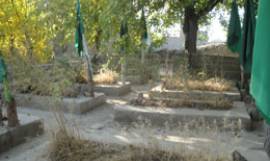The Killid Group, April 8, 2013
A testimony: “My wife has never been the same since our sons died”
"When the nine coffins were brought into the house everyone cried and screamed, but not my wife. Her voice was not heard."
By Sohaila Weda Khamoosh
Kabul's seventh district is also called Sarzamine Sokhta in Dari (Burned Land). Nearly everyone here has lost a family member in the successive rounds of blood-letting witnessed by the city. A testimony*
It was 1999. The sun had just gone down in the western sky recalls Mir Abdul Wadood, now a teacher in a school in neighbouring Parwan, when Taleban dragged away and shot 10 family members. Among the dead were his two grown-up sons, two nieces, two nephews and his wife's two nephews.
One other nephew, Abdul Hai, had a miraculous escape. Shot in his face, he managed to drag himself on to a road before collapsing. Passersby took him to Anaba Hospital in Panjsher, where he gained consciousness, and told them the exact location of the cold-blooded murder of nine other family members.
They lie buried side-by-side in nine graves in Parwan's Laghmani village. The green flags on the graves are visible between the yellow leaves of trees from miles away. The dead were all between the ages of 25 and 35 years.

The family who were originally from Khairkhana in Kabul and from Karez Mir, north of the city, had sheltered in Parwan province to get away from the Taleban who had formed the government in Kabul. However, the Islamic fighters continued advancing north in pursuit of Ahmad Shah Massoud who had retreated with his forces to his stronghold in the Panjsher Valley.
Wadood who teaches in a school in Charikar, the provincial capital, says in 1999 the Taleban arrived in a Datsun pickup truck at their home, and took away 10 young people, between the ages of 20 and 35 years. The captives, their hands tied behind their back, were taken to Dashte Pole Sorkh in Jabal Saraj, and made to stand in a circle. One by one they were dragged into the middle of the circle, and shot dead.
Killed by grief
"Unfortunately I was in Kabul at the time, and the way to Parwan was blocked. When I came back 40 days later I went to the graves of the nine members of our family including my two sons, one 29 and the other 25. I cried," he says. "The graves were like swords in my eyes. It hurt so much," he adds.
There was more bad news for Wadood. His sister who had lost two sons and a daughter had died of a broken heart, and no one had told him. He says on his return from the graveyard he decided to visit her. "I wanted to share her grief," he says, "That is when relatives told me she had died. The fresh grave near the nine, which I had seen and prayed over thinking it was a neighbour's, was actually my sister's. Her heart had failed from grief."
Wadood gets up and shuts the door leading to an inside room where his wife is. He says she has been very disturbed ever since he told her that a journalist was coming to interview them about the death of their sons. "My wife has never been the same since the deaths," he says. "When the nine coffins were brought into the house everyone cried and screamed, but not my wife. Her voice was not heard. Her depression worsened when our elder son's widow married again, leaving us to take care of their two children."
Scarred forever
Wadood confides that their sons are never mentioned because it upsets his wife. "Laughter has left our house," he says. "We never mention our sons. I have had to bury their remembrance along with them, I have no choice," he adds. A third of his salary as a schoolteacher, which is roughly 6,000 Afs (110 USD), is spent on medication for his wife.
His story is not unusual, Wadood says. There is not one family in Sarzamine Sokhta that is not scarred by the decades of conflict in Afghanistan. Afghan civilians have paid the highest price.
Between 1996 and 2001, the Taleban and Massoud's Northern Alliance fought for control of Parwan. Every time the Taleban won the province, the Shariah law was implemented. Parts of the province went back and forth from Taleban hands to Massoud's. Hundreds of civilians died. The war also destroyed many jeribs of vineyards in the north. The fighting ended with Massoud's assassination by two suicide attackers believed to be al Qaida on Sep 9, 2001, two days before the bombing of the World Trade Centre in New York. In retaliation US forces invaded Afghanistan and ousted the Taleban in December that year, and a new chapter in the tumultuous history of Afghanistan started.
* The testimonies of survivors of war crimes are our contribution to creating greater public awareness about people's hopes and claims for justice, reconciliation and peace. These testimonies and life stories are distributed internationally by the news agency IPS-Inter Press Service and are the basis for a radio drama that is being broadcast by seven Killid radios.
Characters Count: 5448
